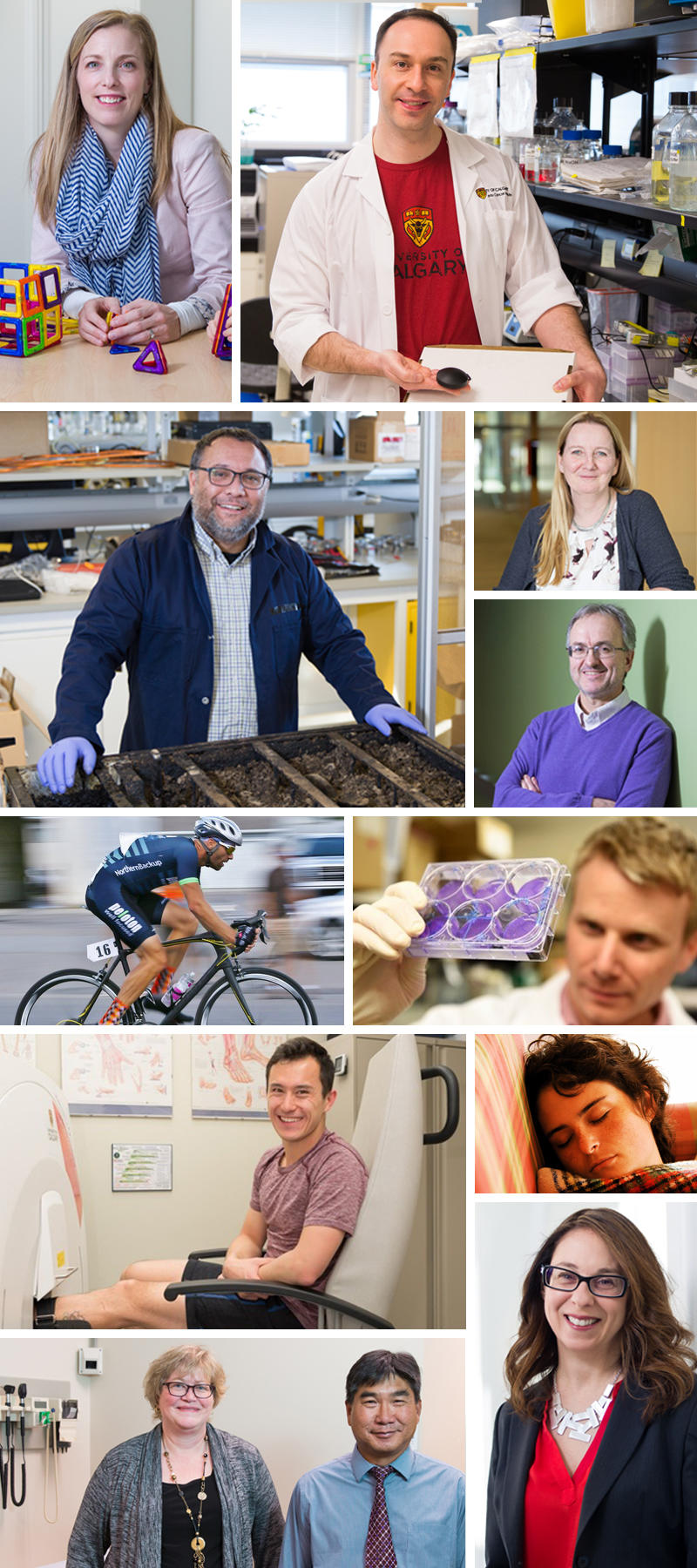Dec. 22, 2017
Top research stories of 2017: Finding radon in Alberta homes, identifying after-effects of family trauma, discovering spill-resistant bitumen

Images from the top research stories of 2017.
University of Calgary
- Clockwise, from top left: University of Calgary's Sheri Madigan leads a study on the multi-generational effects of childhood adversity; Aaron Goodarzi expands his study of radon; research by Kathy McCoy and Pere Santamaria discovers a gut bacteria protein that helps prevent inflammatory bowel disease; Doug Mahoney puts existing cancer drugs to a new use; a Faculty of Kinesiology study looks at the effects of stockpiling sleep; Sandy Hershcovis studies workplace incivility; multiple sclerosis researchers Luanne Metz and V. Wee Yong find a new use for a common acne medication; the Cumming School's Centre for Mobility and Joint Health looks at the impact of high-impact sport on figure skaters; a Faculty of Kinesiology study explores how hard data can help cyclists train; Ian Gates invents spill-resistant bitumen balls.
It started with Cumming School of Medicine researcher Aaron Goodarzi testing his own home for radon, the invisible odourless gas that is the number one cause of lung cancer in non-smokers.
And while his house got the all-clear, Goodarzi wasn’t content to stop there. He challenged 40 of his colleagues to test their homes, and soon after recruited more than 2,000 people to join the largest southern Alberta radon gas study to date. The results? One in eight Calgary homes exceeds Health Canada acceptable radon level, and there is no unaffected neighbourhood.
Having shown radon is a genuine and growing public health concern in southern Alberta, Goodarzi and his team have now launched the Evict Radon awareness campaign. They want to educate people about the effects of radon gas and encourage as many Albertans as possible to test their homes while also gathering data for medical research.
The radon awareness story and nine others make up the UToday readers’ top 10 research stories of 2017, showcasing the important advances made at the University of Calgary across a range of disciplines. Read on and click the links below for more details about the discoveries and who was involved in research ranging from oil and gas engineering to the cause and treatment of autoimmune diseases, from intergenerational family trauma to workplace rudeness.
- Adverse childhood experiences transfer from one generation to the next: A study led by Sheri Madigan in the Faculty of Arts shows that women who suffer four or more adverse childhood experiences — such as abuse or having a parent with mental illness or an addiction — are more likely to face pregnancy and postpartum problems. Those issues may in turn impact the mental or physical health of their children starting what Madigan terms “a cascade of risk.”
- Protein in gut microbiome implicated in inflammatory bowel disease: Researchers Pere Santamaria and Kathy McCoy from the Cumming School of Medicine discovered that a protein in gut bacteria helps prevent inflammatory bowel disease (IBD). The protein recruits white blood cells to kill an immune system cell that orchestrates the disease. But that same mechanism can also overreact to the presence of the protein, overstimulating the immune system and triggering IBD, an autoimmune disorder.
- Spill-resistant bitumen can ship pipeline-free: In an accidental innovation, Ian Gates in the Schulich School of Engineering has created a breakthrough technology in bitumen balls. The pellets range from golf ball to pill-sized. Their liquid core and solid-phase skin mean they are self-sealing, so they can ship in standard rail cars with a vastly reduced chance of a damaging spill or environmental accident.
- Stockpiling sleep can moderate impact of sleep deprivation: Faculty of Kinesiology researcher Guillaume Millet and his colleague Pierrick Arnal have discovered that clocking extra sleep in the lead up to a period of sleep deprivation improves physical performance and cognitive function. They are hoping their work will provide a potential strategy to manage the sleep-wake cycle for athletes and others in shift-work professions.
- Study tracks impact of extreme athleticism on figure skaters’ bones and joints: Some of Canada’s top figure skaters are participating in a new study in the Cumming School of Medicine’s Centre for Mobility and Joint Health. Because figure skaters load one leg more than the other when they take off and land, this study will compare skaters’ legs, looking for signs of bone weakness and stress fractures.
- New research aims to inject science into the way cyclists train: A new study will monitor fitness profiles for 12 local cyclists over a training season. Using instruments that will provide millions of data points, Faculty of Kinesiology’s Juan Murias and his colleagues hope that by tracking how physiological profiles change in relation to training they can generate hard data to inform, radically improve and even personalize the way cyclists train.
- Common acne medication offers new treatment for multiple sclerosis: A Canadian clinical trial led by Luanne Metz from the Hotchkiss Brain Institute found that the common acne medication minocycline can slow progress of relapsing-remitting multiple sclerosis in people who have recently experienced their first symptoms. The discovery is unexpected, and also significant, as it offers a safe and affordable treatment options for those with early onset MS.
- Trickle-down impact of workplace incivility: New research shows that when powerful people in a workplace are rude, degrading, or ignore others, it wreaks havoc on the victims’ sense of belonging, feelings of embarrassment and job insecurity. The study, led by Sandy Hershcovis from the Haskayne School of Business, shows targets can even experience physical symptoms.
- Insight into cancer immunotherapy: Researcher Doug Mahoney and a Cumming School of Medicine team discovered an immunotherapy combination that uses existing cancer drugs in a whole new way. The results suggest that rather than looking at cancer drugs as tumour-targeting, their most important biological role might instead be to rev up the body’s own immune system.
